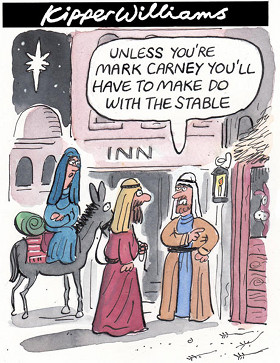
Hector Sants was the boss of the UK financial regulator between 2007 and 2012, the FSA. He was not a particularly distinguished CEO of this organisation, nor covered in much glory dealing with all the issues and questions over financial industry governance after the massive crunch we've had. Plus the numerous scandals uncovered over the past few years (and very recently). Criminal. Squalid. Sordid. Well, so much for regulation ...
To me then, it was a fairly depressing report to see he was joining Barclays Bank as "head of compliance and government and regulatory relations".
The phrase regulatory capture is one that comes to mind. It does so more frequently than it used to.
Mark Carney, the head of the Canadian Central Bank, was recently chosen to succeed Mervyn King as head of the Bank of England, to much general acclaim. It was recently reported that he :
So, almost half a million pounds as a salary, as well as a quarter million on top of this for housing (plus pension on top of all this). A question I had was why a salary can't be expected to pay for housing? Mine has to.
I'm not a socialist, let alone a leveller (although if you understand their "platform" you'd agree with much of it today) but are we "all in this together" as Mr Osborne tells us?
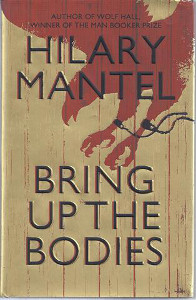
I finished Bring Up the Bodies a few weeks ago and thought of a couple of things worth noting.
The first was the absolute importance of the arranged marriage. A marriage contract was pursued and entered into much like a business contract, something mutually beneficial to both parties. Looking back now, an arranged marriage has been the normal state of affairs in our society for a very long time (possibly millennia) and only recently (last century perhaps) has marriage become as free as it is now. A big change.
The second thing that struck me was the total and complete power of the king. Thomas Cromwell is a very confident and self-assured character but even he has a great sinking in his stomach and a terrible dread when Henry starts to press him in a less friendly way. The King has total power over your life and property. During this uncomfortable conversation with the King, we start to realise, with Cromwell, how easily everything might fall apart. He's "low born" and everything he owns is at the pleasure of His Majesty.
Our status with respect the law and the monarch is very different now. A lot of people have died to change that. We plebs should remember that.

At the National Portrait Gallery a couple of weeks ago (see below) for the Lost Prince show. Whilst there, I popped into the shop and bought a Holbein print. A beautiful drawing.
I'd thought of framing it and giving it away as a christmas present but, having framed it, I decided I liked it too much to give away.
Holbein's been in my thoughts at other times recently because he makes a few appearances in Hilary Mantel's recent books about Thomas Cromwell. I've just finished Bring Up the Bodies, a book I'll try and write about soon.
Portrait of Elizabeth, Lady Vaux
by Hans Holbein the Younger (c1536).
See : wikipedia.
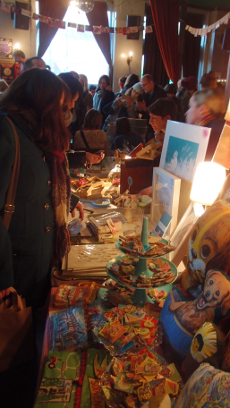
It must be 10 or 15 years since I was last inside Brixton's Dogstar. That would have been at night in its pub/club incarnation.
On Saturday it was host to the Crafty Fox Market and it being just down the road, I ventured down Coldharbour Lane to have a look. Lots of small independent stalls over all three floors selling all sorts of things: a lot of jewellery, art work, clothes and stuffed toys.

Pretty busy. Not exactly a Christmas market but I think a lot of people had the same idea.
I bought a mini (4x4cm) acrylic canvas painting by Hatch Art.

I like Starbucks. It's often a comfortable place with friendly staff. Coffee is usually OK as well.
I posted about tax avoidance recently and have stopped using Starbucks as a small protest. Today, there are reports that Starbucks have decided to "volunteer" extra tax to us. And as mentioned in the article linked above in the Daily Telegraph, Starbucks uses "perfectly legal mechanisms" to reduce its tax bill.
Technically, this might be so, but as Richard Murphy says :
Let me reiterate what tax avoidance is. It is getting round tax law to obtain an advantage parliament did not intend. So it is not paying money into a pension within allowed limits or subscribing for an ISA. Parliament intends those reliefs. It is instead finding loopholes and discrepancies in and between tax and accounting laws either in the UK or between the UK and other places so that income falls out of the UK tax net.
It is, of course, often said that tax avoidance is legal. I dispute that. Correctly it is not illegal. But nor is it sanctioned by parliament. It is in a grey area where the law is in doubt, and very often the application of law is, in the absence of a general anti-avoidance provision, also in doubt. That is precisely why this is a moral issue. When the application of law is uncertain, and it can be, morality has to take its place as a guiding principle as to right action. The inclusion of morality in tax debate is appropriate for precisely this reason.
As he says, paying tax is not like a charitable donation, a voluntary gift. Let's see how things go and I am glad Starbuck's is paying attention. I think the only option to make things work will end up being done at government, or hopefully international, level however. A glocal fix rather than a local or individual "fix" (that wouldn't be).
I've been trying to find time to write down my thoughts on some of the recent news regarding tax avoidance and the bad publicity that came out of the grilling the three finance heads of Google, Amazon and Starbucks endured in front of the Public Accounts Committee in Parliament a week or so ago.
And it was very bad publicity. Whether technically legal or not, it leaves a bad taste in one's mouth when so much effort is put into avoiding paying your fair share of tax. I like all three companies but it's a question of basic fairness.
Luckily, I don't have to say much more because John Kay says it much better here : Corporate tax should be fair and shared.
Read it - it's short and to the point. Life isn't fair on its own. We have to engineer fairness in.

A visit to the National Portrait Gallery to see The Lost Prince exhibition. The "prince" being Henry Stuart, first son of James 1st of England (6th of Scotland), who would have become King Henry IX if he'd survived. Unfortunately, he died young (18) of, what appears to have been, typhoid. Wikipedia has a good page.

Good exhibition about someone I hadn't known at all. Considering his brother became King Charles I, it is interesting speculating what might have been different if he'd lived. The 17th century may have been quite different. Would there have been a Civil War? The Commonwealth? A very pivotal period of history. Some good discussion on the NPG blog along these lines.
As well as the main attraction, the NPG has a lot of other beautiful paintings, including some good contemporary portraits. A couple I particularly liked were by Germaine Greer by Paula Rego and Sir John Tavener by Michael R. Taylor. The Rego is very deft work in pastel.


Well, I tried. I actually ended up liking Gnome 3, or at least Gnome 3.4. Yes, there were some rough edges and parts of it didn't work the way I wanted, but most of that I fixed using an extension. I was never 100% happy with things like application (alt-tab/` switching) but learned to live with it.
I'd switched to Gnome 3 almost everywhere except my living room (still on Debian Stable/Squeeze so running Gnome 2). Laptops and work workstation. Then it all went wrong ...
- Laptop - my primary laptop, a Thinkpad X220 (so pretty new), suddenly wouldn't load the full experience, insisting on "fallback" mode. OK I thought, I'll live with it and it will eventually fix itself with an update somewhere. This is Debian Testing and using Intel open-source drivers after all. But it wasn't fixed as long as I tried - for 2 or 3 months eventually. I started getting (sort of) used to "fallback". But this is clearly a crippled Gnome 2.
- Work system - Debian Stable using the nouveau NVIDIA driver. All is well for a couple of months, then - an update somewhere and boom. Now the desktop is locking up. Switching workspaces freezes it for 10-20 seconds, other desktop interaction similarly causes lockups or high loads. Basically unusable.

At work, I need a working desktop now and don't have time to wait or mess around. So I booted into XFCE and carried on.
So I set it up and configure it, and then realise that XFCE (pretty much) just works. In fact, it works much like Gnome 2. I also realise that I like the Gnome 2 style and notice all the papercuts that are no longer present.
I've now switched everything I run to the XFCE desktop and am both happy, comfortable and productive with it.
I may try Gnome 3 again in the near future, especially if and when v3.6 hits Debian, but thank goodness I have such a great choice of free software alternatives.

I like the film, it really is something from another world now. But what really threw me was in the opening sequence.
Ginger Rogers is singing "We're in the Money" with the usual Busby Berkeley chorus, but half way through (about 1:40 in) she starts singing the song (what I thought was) backwards! A bit of digging around and it turns out she sings it in pig latin. Very strange but somehow enthralling, and very unexpected! It's great, even the odd in and out of focus the camera seems to do ...
I got my Raspbery Pi on Friday and although I knew what to expect, it still amazes when you see how small it is.
The Raspberry Pi is a tiny ARM based computer, with 192MB RAM, CPU, GPU, network and USB on a board a few inches across. It only costs £25, so I felt, why not? Here it is sitting on top of a laptop, hooked up and running :

Of course it runs Linux, but unlike my phone which runs the Android variant, the Raspberry Pi is running Debian. This is hooked up to my TV via HDMI (doing an aptitude update):

This is a real computer not a toy. I just need to figure out what I might do with it now!

Watercolour is a very distinctive medium and can produce some fine works of art.
I was passing the Curwen Gallery the other day and went in to look at a few paintings by Lucy Willis. I was very impressed by many, almost all of Malta, Gozo and Syria ("in quieter times"). She captures the sunshine and shadow well.
Ms Willis will be giving a talk at the Gallery on Saturday 19th at 2 pm. I might pop up and listen to what she says, and perhaps ask a question on technique.
It is worth having a look through her online gallery and also to note that there are many pictures for sale. I'd love to own one or two.

... Hello Squeeze.
I belatedly upgraded my VPS (Virtual Private Server) to the current stable version of Debian Linux. This VPS hosts my blog, mail and a few other important things. I've been very late doing this and security concerns have been weighing on my mind recently. The old stable distribution (Lenny) does not get security updates anymore and the internet is not getting any safer ...
This is the first time I've done a "proper" upgrade in place, the "Debian Way", and I'm happy to say that everything appears to be working. I hate to think about all the magic that goes on behind the scenes to achieve this sort of upgrade automatically, but the process was smooth and pretty straightforward. Debian rocks. I also RTFM.
For those of you that have no idea what I'm talking about, Debian is a distribution of the Linux operating system and they name each release after a character from Pixar's Toy Story.
Let me also say that my hosting provider rocks as well, and I can thoroughly recommend them : Bitfolk.

Hilary Mantel's sequel to Wolf Hall, out soon, is called Bring Up the Bodies. It already has a very positive review in the New Yorker.
Mantel's prose is concise and beautifully written; Wolf Hall was one of those books that I didn't want to finish so I'm looking forward to reading this. She has not only made a very readable hisory novel, but also made Thomas Cromwell likeable in many ways. A rare feat many people would say.

I think the BBC are still the best in the world for many types of programs, both radio and television. Nature programming is probably one, documentaries another. They can produce the odd good piece of drama as well.
Having always loved reading about history, both ancient and modern, I've been spending time watching some BBC history recently. I've been reminded about how good they can be sometimes. They are also a reason I would happily pay a BBC subscription fee (not that I like the compulsion of the TV license).
I've been watching both Ancient Worlds and In Search of the Trojan War, loving both. However, Michael Wood's In Search of the Trojan War just edges Richard Miles' Ancient Worlds in my opinion.
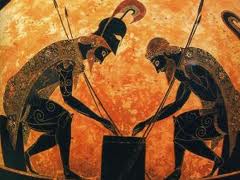
The Trojan War story has such a focus however, that it fascinates just a little more. Michael Wood travels from Turkey to Greece to Berlin and even to Ireland for his historical detective work, covering history, archaeology, myth and language.
Even though it was shot in the early 80's, and shows its age in places (it is not HD quality unfortunately), it is up to date on much archaeological evidence and research.
The war for Troy is supposed to have taken place in bronze age Greece, centuries before Homer and long before the Greek language and script we know from the classical period. Such timescales lead to a great accretion of myth and legend. The evidence that links Hisarlik in Turkey to ancient Troy is not conclusive, but for all the faults made by Heinrich Schliemann and his successors, this is a very likely place to find the city. Michael Wood makes this case quite convincingly and in a hugely entertaining manner.
Both series are very highly recommended. You can buy In Search of the Trojan War on DVD for only £5.
An article from Newsweek, via The Daily Beast, The Doctor Will See You-If You're Quick describes how stressed the relationship between patients and doctors has become today in the US.
A number of reasons are highlighted, including health care reforms, aimed at reducing costs (mixed results there), medical insurance changes and an assembly line mentality. A lot more people are in the system now, and the number of, and complexity of, treatments has also risen hugely. No wonder things are getting stressed.
Similar issues arise in the UK, although much mitigated by the National Health Service, even though it is certainly extremely imperfect.
I'm in the process of sorting out a doctor (General Practioner) at the moment, so this has some resonances for me. The health service is one of those things that always gets people worked up. Health is important to everyone, but it's also very expensive, and getting much more so. Affording it is getting harder but working out where to compromise and reduce costs is no easier either.
I find the odd fortune cookie an entertaining diversion, meaning the computer generated type, rather than the (usually) bland paper versions.
I often automate their appearance on web pages I have some control over, cheap and easy filler content. There are a lot of dire ones of course, but also some laugh out loud funny, or even thought provoking. Many classics are great quotes e.g.
-- Winston Churchill
The thought occurred to me: how well do our own politicians and statesmen today stand with respect to good speeches, quotes or general intellectual ability? Not very highly is my feeling.

I've mentioned Dr. Robert Lustig on this blog before because he has a very popular Youtube video on the dangers of sugar in the diet. His basic take is that it's toxic.
His Youtube hit is about an hour long and some people might struggle to watch it all. Luckily, the CBS show 60 Minutes recently aired a more easily digestible piece on the debate called "Is Sugar Toxic?". Worth watching and only 15 minutes. The sugar "industry" spokesman does not have many good arguments when offered a platform at the end of the piece.
A big problem (like salt) is how many foods have sugar in them now, even foods that one would not immediately take as "sweet". It's hard to know what's in food sometimes, and impossible if the labelling is vague.

Nassim Nicholas Taleb is always worth reading.
From the Sais Review How to Prevent Other Financial Crises (PDF) and Hammurabi's Code :
And thus, Taleb and Martin argue that financial agents need more "skin in the game".
This means that :
It's good to see smart people like Taleb, Kay and Haldane thinking hard about what went wrong and how to fix things. As Kay's said, we need to separate the "casino" part of the bank from the "utility". Human nature being what it is, you can't always trust people, especially when such large amounts of money are floating around and the reward structures are misaligned. Financiers should understand that without "skin in the game", then Hammurabi's Code might mean a sticky end ...

I've been getting a lot of "robo calls", recorded marketing telephone calls, from various organisations lately. From never getting them at all, I was now getting two or three a week. My habit now is is to pick up the phone and say nothing initially, waiting for the other party to start talking. The calls all seemed to be about payment protection insurance, and how to reclaim money if it had been wrongly sold to you.
Well, I was sick of it. So I have now registered and added my telephone number to the Telephone Preference Service (TPS) and hope this stops the unsolicited and marketing calls. It might take 28 days to filter through the system, but I hope that I'll be free of them after that. If not, I'll be making sure my complaint is heard and the perpetrator punished!
Warren Buffett, the well known investor/businessman, has/had a fortune of $62 billion. That's a lot of money. How much would he have if he had out-sourced the management of his investments to a typical financial management service?
From John Kay's book, The Long and The Short of It :
Suppose that Buffett had deducted from the returns on his own investment - his own, not that of his fellow shareholders - a notional investment management fee, based on the standard 2% annual charge and 20% gains formula of the hedge fund and private equity business. There would then be two pots: one created by reinvestment of the fees Buffett was charging himself; and one created by the growth in the value of Buffett's own original investment. Call the first pot the wealth of Buffett Investment Management, the second pot the wealth of the Buffett Foundation
How much of Buffett's $62 billion would be the property of Buffett Investment Management and how much the property of the Buffett Foundation? The - completely astonishing - answer is that Buffett Investment Management would have $57 billion and the Buffett Foundation $5 billion. The cumulative effect of 'two and twenty' over 42 years is so large that the earnings of the investment manager completely overshadow the earnings of the investor. That sum tells you why it was the giants of the financial services industry, not the customers, who owned the yachts.
This shows how big a deal cumulative interest is. Astonishing is the right word.
So, Sunday was a rainy day and I did a trip to the National Portrait Gallery for the Lucian Freud exhibition.

Although booked in advance, and some attempt at restricting the numbers viewing at any one time (time slots), it was quite busy, so I had to edge around some paintings carefully (at least in the first main rooms). The layout was in chronological order but the room map was hard to decipher, so also a little confusing.
The early works shown were from the 1940's and early 50's, including the picture on the left, Girl in a Dark Jacket, Freud's 1947 portrait of his first wife Kitty.

On the right, Girl with a White Dog (1950-51), Kitty again. Of this painting, the Tate says :
The style of the painting has roots in the smooth and linear portraiture of the great nineteenth-century French neoclassical painter, Ingres. This, together with the particular psychological atmosphere of Freud’s early work, led the critic Herbert Read to make his celebrated remark that Freud was ‘the Ingres of Existentialism’.
The sense that Freud gives of human existence as essentially lonely, and spiritually if not physically painful, is something shared by his great contemporaries, Francis Bacon and the sculptor Alberto Giacometti.

An obituary of Kitty (Godley now) appeared in The Telegraph. Her mother was Kathleen Garman, one of the infamous Garman Sisters, a part of the bohemian bloomsbury set in London. Lots of fairly typical upper-crust english immorality, including her mother being shot.
I found many of these early portraits delicate and beautiful.

His later pictures, the ones he is most well known for, are very different. The painting is looser and the flesh becomes almost overwhelming. Some of the subjects almost repulse with their fixed and unsympathetic gaze, the sagging flesh and underarm hair. One can only take so many large Nude Portrait after Nude Portrait.
At £14, this exhibition costs almost six times the RBA (see last post). Was it worth it? To me, not quite, but the early Freud almost made it so.

A bit of rain in the mid-morning but it cleared up into a lovely sunny afternoon, even if a bit blustery. So I hopped on the bike and trundled my way up to The Mall and the RBA Annual Exhibition for 2012. Saturday afternnon on the bike is a little bit more sedate but you still have to watch out for the cars and buses. Not quite so many speeding bikers around.
I thought that the only gallery on the Mall was the ICA but the Mall Galleries are just up the road, a little closer to Trafalgar Square. The show is a real bargain at £2.50, and I would highly recommend a visit if you're around central London (it's open until Saturday 10th March).

The great thing about a show like this is the variety. Lots of different artists on display, young and old, mostly oils but also a lot of watercolour, pastel, drawing, sculpture and print. Available to buy as well if you feel like an alternative investment.
There are some really stunning works here and I took a few notes of the names, but also bought an exhibition guide. For a sample of some of the works, visit the web site.




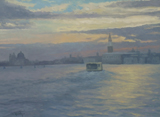
I could go on a long time because there were so many good pieces to see. Of particular note were also the number of young artists on show, from various schools and colleges up and down the country. The show is on until Saturday 10th March and well worth the trip.
The next exhibition at the Mall Gallery is Royal Institute of Painters in Water Colours 200th Exhibition and the one after that is The Wapping Group of Artists: London and its River, so it looks like a busy gallery and one to visit again, regularly.

I have a lot of sympathy for ordinary Greeks just now, trying to get by when things are looking so bad. But for the Grace of God and all that. I've been to Greece a long time ago, and hopped around a few islands, as you do. And back then, it was clear that Greece was a lot less developed. This was clear in Athens and would have been clearer still in the countryside.
This is a quote from Economist Meg (Megan Greene) :
We have all heard a great deal about all the various reasons that Greece is in such dire straits. We know that there was a desire from the EU leadership to look the other way in the interest of the project. We know about the massive imbalances created between the very different economies within the Eurozone. We know about the huge amount of fraud and corruption endemic in the country. The list could go on, and will no doubt be added to over the next few years as things play out.

An article I recently read about this crisis took a slightly different route in explaining the background to the problem, and why Greece has ended up the way it is. The thrust of the argument is historical and tries to illuminate the nature of Greece as a people and a state. Greece has had a very turbulent history, even leaving aside the bad 20th Century, with tyranny and despotism in the Military Junta, and war and terror with the Nazi occupation. The country's been the hub of the Roman Empire and Byzantium, then extinguished and overrun by the Ottoman Turks, leading to hundreds of years of subjugation.
From Greece: The history behind the collapse by Georges Prévélaki :
This sort of history changes people, and changes peoples' concept of nationhood. Furthermore, the way that the state has grown and functioned is quite different to the way the Western (Westphalian model) states grew up :
And this is the way it has worked for a long time, and one of the main reasons that the EU and the Eurozone membership has been such a disaster.
The article does offer a glimmer of hope: that the Greek people inhabit a larger world than the Greek "territory" itself, with many very able and astute people working overseas. Greece has a large pool of talent throughout the world. If it can rebalance itself at home, maybe it can attract these people back to rebuild. Right now, it is difficult to see much hope in the situation, one has uneasy feelings that things will get a lot worse before they get better.
This was an excellent and thought provoking article for those interested in a historical and social background.
I never used to drink whisky, it having left some bad memories from a (partly) misspent adolescence. I didn't like the taste. But a few years ago, after a particularly stressful day at work, and having loudly moaned a bit about things to my manager, he suggested I calm down and buy a bottle of whisky on the way home. The odd thing is, I did! I can't remember what it was, but it would have been a malt, perhaps a Glenfiddich or Macallan.

Having drank a glass on the Friday evening, and finding it bearable, I now found myself owning a whole bottle containing lots of glasses of whisky, so I decided to carry on and try and enjoy. Now, a few years later, whisky's a drink I like a lot, and try and enjoy as I would a good wine. I don't drink so much wine as I did (a bottle a week mainly), and don't drink beer, I've found a decent single malt a welcome pre-meal or late night drink. Like wine, there are a lot of varieties from a lot of different countries (although I have stuck with Scotch so far).
My current bottle is a Bowmore Tempest Batch 3, a beautiful, smoky Islay malt. A dram you need to be slightly cautious of due to it's being cask strength, so 56% proof, not the usual 40%.
What I'm trying to do, like many whisky drinkers, is to find a good enough blend, one that is most bearable, and closest to the taste of a malt. It's very hard going back to a blend when you get used to a drink like this ...
I've never been to the National Portrait Gallery and it was starting to rankle a bit. It's right beside the main National Gallery and also free, so there's no excuse ...
I was only there a couple of hours, but one of the most striking paintings I saw is shown on the right.
It's a self-portrait by Anna Katrina Zinkeisen who, despite the name, turns out to be a British artist. You can see the full painting on the gallery site Oddly, what it made me think of was the famous We Can Do It! WW2 poster. My photograph does not do it justice.
According to wikipedia, Anna and her sister Doris painted murals on the RMS Queen Mary, a ship now docked in Long Beach, California. Doris Zinkeisen was also a very talented artist. I love coming across great works of art by artists I had no inkling existed. So far, there are a great many of them! Again, according to Wikipedia, they were Scottish born but with a father who could trace his ancestry back 200 years earlier in Bohemia (which might mean we have some fall-out of the Thirty Years War to thank for their residence here).
The BBC have a slideshow of some other paintings by Anna Zinkeisen.
Happy Year of the Dragon!
I had to negotiate very busy streets around Soho and Shaftesbury Avenue, with a lot of streets closed to traffic and a lot of people out. It's Chinese New Year and the celebrations are always a family time on the last Sunday of January. Very busy this year!
A great comment on Reddit a few weeks ago, leading to a good discussion in the comment thread below it. The comment was from an MIT graduate and describes how badly his college education started to go until he learned how to ask for help. The comment is titled I'm not as smart as I thought I was and makes salutary, but inspiring, reading :
The moral of the story is that it's stupid not to ask for help if you get stuck, at any stage in life or education. Even, or maybe especially, at a place like MIT.
From John Kay's latest blog post :
Looking at the different outcomes for North versus South Korea and East versus West Germany :
There are few controlled experiments in economics, but these are as close as we get, and the results were clear. They were also unexpected. Hard though it is to believe today, in the 1960s many serious commentators on left and right believed that Russian economic progress threatened western hegemony. Those on the left were naively credulous and those on the right victims of paranoid fantasies.
A perhaps apocryphal story tells of a Russian visitor, impressed by the laden shelves in US supermarkets. He asked: “So who is in charge of the supply of bread to New York?” The market economy’s answer – that not only is no one in charge, but it is a criminal offence for anyone to seek that position – is surprising.
As for whether "greed" can sometimes be "OK" (from an amoral perspective), read the linked article above to find out.
The word "capitalism" is thrown around a lot just now, primarily because it may or may not be on its last legs, depending on who you ask. If, indeed, we can call our economic system "capitalism" at all. So it's a good idea to try and make sure we understand what we mean when we talk about it. This is why I am always grateful to read a well considered and non-ideological summary of the system. Never the final say of course, but a brick in the wall of understanding.
I subscribe to John Kay's blog because he posts well reasonable discourses on things like this. His take on capitalism emphasises the shift that took place separating ownership from actual control. Ownership diffusing through shareholding and control moving to a professional managerial class and a corporate bureacracy :
Kay's article Let's talk about the market economy is concise and worth reading.
In a slightly different vein, he also recently wrote a review of a book called Good Stategy/Bad Strategy by Richard Rumelt. Business book sections have more than their fair share of rubbish it appears, but this book sounds better :
Kay is a severe critic of the current financial system and most of his criticisms ring true to me. A lot of people are making similar arguments but Kay does so in a clearer and, dare I say it, saner way than many. This is a desire to fix the system not destroy it.
"Capitalism" working properly, fairly and for the common good.
John Kay : accessible & relevant economics
Daniel Kahneman makes an appearance in The Black Swan by Nassim Taleb, a book I read last year and one of the best books I've ever read.
Kahneman is a nobel prize winning psychologist. His Nobel is in Economics, and it is ironic that amongst all the people Taleb has a go at, economists figure very large. We will not hold that against him however, as his main speciality is psychology, especially the way we think and how we deal with risk and decision.
As he says, people are "endlessly complicated" and the way we think, how easy it is to fool us or guide our thought is fascinating. Kahneman has a book out called Thinking, Fast and Slow which is on my (ever growing) list of things to read. In the meantime, a recent Google Talk he gave is a good taste of his area of research :
It is well worth an hour of your time (50 minutes of talk plus questions).
He is also found on Ted.
Happy New Year to all.
Although it's a quiet day on the 1st January, I saw that the Tate was open so decided to pop down there for a couple of hours. Now that TFL have a live bus departure web page, getting a 20 minute bus ride is much more pleasant as well. I know when to walk to the bus stop and wait ...
One of the current exhibitions is John Martin: Apocalypse, featuring some very monumental paintings done in the early to mid 19th Century. His most famous is from a group of three (a triptych) and called The Great Day of his Wrath :
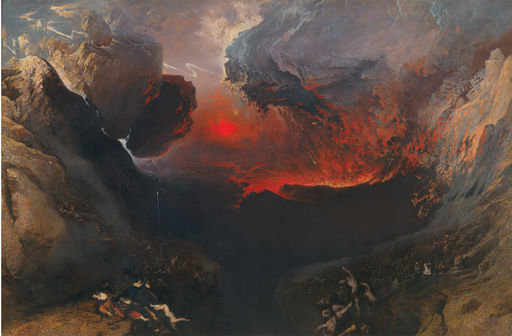
As I say, monumental, that is: large (3x2m) and detailed. Martin excelled at the extreme panorama, a generally fantastic landscape, often peopled by small, detailed human forms (or entire armies). They really are almost cinematic, widescreen films. In fact, some film makers acknowledge him as an inspiration (like DW Griffith or Cecil B. DeMille).
The Great Day of His Wrath shows the end of the world. It is one of three paintings shown together as a triptych, the others being The Last Judgment and The Plains of Heaven.
The Tate shows all three side by side and also puts on a show courtesy of Uninvited Guests. You can take a seat, the room darkens and then light and colour is projected onto the paintings, animated in part to bring out some of the horror (apocalypse) or tranquility (heaven) of the scene. Alongside some earthquake rumbling and audio effects, the show is very effective. It also includes some spoken parts, descriptions and reactions to the works, and a bit of biblical recitation. All good fun, and it let me get off a snap as shown below :
The paintings are very impressive and were very popular in their day (being toured internationally even). However, Martin went out of favour for a long time, being regarded by the "high brow" art establishment as too "popular" and garish. I can see some of the reasons why here, and to some degree, the paintings can look a bit like a paperback book cover, perhaps even pulp science-fiction or fantasy. But the reaction of the art establishment to a popular taste has always been negative it seems, even today.



